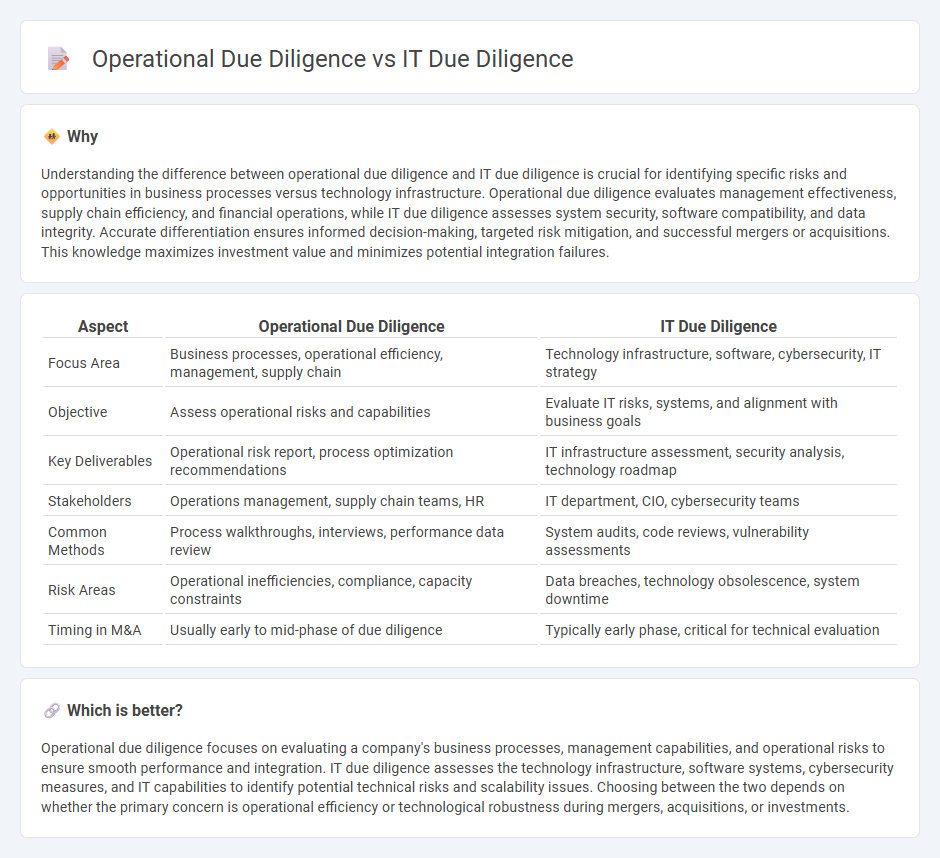
Operational due diligence focuses on assessing a company's business processes, management effectiveness, and operational risks to ensure smooth functionality and long-term value. IT due diligence evaluates the technology infrastructure, software systems, cybersecurity measures, and IT capabilities to identify potential vulnerabilities and integration challenges. Explore the critical differences and key components of each due diligence type to enhance informed decision-making.
Why it is important
Understanding the difference between operational due diligence and IT due diligence is crucial for identifying specific risks and opportunities in business processes versus technology infrastructure. Operational due diligence evaluates management effectiveness, supply chain efficiency, and financial operations, while IT due diligence assesses system security, software compatibility, and data integrity. Accurate differentiation ensures informed decision-making, targeted risk mitigation, and successful mergers or acquisitions. This knowledge maximizes investment value and minimizes potential integration failures.
Comparison Table
| Aspect | Operational Due Diligence | IT Due Diligence |
|---|---|---|
| Focus Area | Business processes, operational efficiency, management, supply chain | Technology infrastructure, software, cybersecurity, IT strategy |
| Objective | Assess operational risks and capabilities | Evaluate IT risks, systems, and alignment with business goals |
| Key Deliverables | Operational risk report, process optimization recommendations | IT infrastructure assessment, security analysis, technology roadmap |
| Stakeholders | Operations management, supply chain teams, HR | IT department, CIO, cybersecurity teams |
| Common Methods | Process walkthroughs, interviews, performance data review | System audits, code reviews, vulnerability assessments |
| Risk Areas | Operational inefficiencies, compliance, capacity constraints | Data breaches, technology obsolescence, system downtime |
| Timing in M&A | Usually early to mid-phase of due diligence | Typically early phase, critical for technical evaluation |
Which is better?
Operational due diligence focuses on evaluating a company's business processes, management capabilities, and operational risks to ensure smooth performance and integration. IT due diligence assesses the technology infrastructure, software systems, cybersecurity measures, and IT capabilities to identify potential technical risks and scalability issues. Choosing between the two depends on whether the primary concern is operational efficiency or technological robustness during mergers, acquisitions, or investments.
Connection
Operational due diligence and IT due diligence are interconnected through their focus on assessing a company's internal processes and technological infrastructure to ensure business continuity and operational efficiency. Operational due diligence evaluates workflows, management systems, and organizational capabilities, while IT due diligence scrutinizes information systems, cybersecurity measures, and technology scalability. Together, these assessments provide a comprehensive risk analysis and identify integration challenges critical for informed decision-making during mergers, acquisitions, or strategic consulting engagements.
Key Terms
**IT Due Diligence:**
IT due diligence evaluates the technological infrastructure, software assets, cybersecurity measures, and IT team capabilities to identify risks and integration challenges during mergers or acquisitions. This process ensures the target company's IT systems align with strategic goals and compliance requirements, highlighting potential hidden costs or technical debt. Explore in-depth insights on how IT due diligence safeguards business value and supports informed decision-making.
Systems Integration
IT due diligence evaluates the technical infrastructure, software compatibility, and cybersecurity measures critical for seamless systems integration during mergers and acquisitions. Operational due diligence assesses the workflows, process efficiency, and team capabilities to ensure smooth integration and minimal disruption in business operations. Explore detailed comparisons and best practices to optimize your integration strategy effectively.
Cybersecurity
IT due diligence focuses on assessing the technological infrastructure, software, hardware, and cybersecurity measures of a target company during mergers and acquisitions, identifying potential vulnerabilities and risks. Operational due diligence evaluates the effectiveness of business processes, including cybersecurity protocols and compliance with regulatory standards, ensuring the company's operational resilience and security posture. Explore the critical distinctions between IT and operational due diligence in cybersecurity to safeguard your investments.
Source and External Links
The importance of IT due diligence - IT due diligence identifies critical technology risks and liabilities that could impact a transaction or integration, while uncovering synergies that inform valuation, negotiation, and post-deal strategy.
A complete technology due diligence checklist - The checklist covers cybersecurity, compliance, infrastructure, portfolio alignment, and spin-off readiness, providing a structured approach to assess technology assets and risks.
IT Due Diligence Checklist: Must-Assess Technology ... - This checklist evaluates software, hardware, cybersecurity, lifecycle management, and alignment between IT and business objectives to ensure comprehensive understanding and risk mitigation.
 dowidth.com
dowidth.com